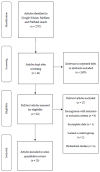Associations of Dietary Bioactive Compounds with Maternal Adiposity and Inflammation in Gestational Diabetes: An Update on Observational and Clinical Studies
- PMID: 33081175
- PMCID: PMC7589556
- DOI: 10.3390/ijerph17207528
Associations of Dietary Bioactive Compounds with Maternal Adiposity and Inflammation in Gestational Diabetes: An Update on Observational and Clinical Studies
Abstract
Gestational diabetes mellitus (GDM) is a common complication of pregnancy that adversely affects maternal and offspring health. Maternal obesity, oxidative stress, and inflammation have been implicated in GDM. In non-pregnant adults, intakes of dietary bioactive compounds inversely associate with insulin resistance and inflammation. However, associations of dietary bioactive compounds with biomarkers of adiposity, antioxidant vitamin and mineral status, oxidative stress, and inflammation in GDM have not been fully elucidated. We addressed this gap by conducting a semi-quantitative review of observational studies and randomized controlled trials published between 2010 and 2020 and retrieved from Google Scholar, Medline, and PubMed. Our analysis revealed that women with GDM are more likely to consume a pro-inflammatory diet before pregnancy and tend to consume fewer antioxidant vitamins and minerals during pregnancy than healthy pregnant women. Women with GDM also have lower blood levels of vitamins A, C, and D and certain adipokines. Several dietary bioactive compounds were noted to improve antioxidant status and biomarkers of inflammation. The Dietary Approaches to Stop Hypertension (DASH) diet and soybean oligosaccharides increased antioxidant enzyme levels. Supplementing n-3 fatty acids, probiotics, synbiotics, and trace elements increased antioxidant enzymes and reduced hs-CRP and MDA. Improvements in inflammation by vitamin D may be contingent upon co-supplementation with other dietary bioactive compounds.
Keywords: diet therapy; gestational diabetes; inflammation; minerals; omega-3 fatty acids; probiotics; synbiotics; trace elements; vitamins.
Conflict of interest statement
The authors declare no conflict of interest. The funders had no role in the design of the study; in the collection, analyses, or interpretation of data; in the writing of the manuscript, or in the decision to publish the results.
Figures


References
-
- Sermer M., Naylor C.D., Gare D.J., Kenshole A.B., Ritchie J.W.K., Farine D., Cohen H.R., McArthur K., Holzapfel S., Biringer A., et al. Impact of increasing carbohydrate intolerance on maternal-fetal outcomes in 3637 women without gestational diabetes: The Toronto tTri-Hospital Gestational Diabetes Project. Am. J. Obstet. Gynecol. 1995;173:146–156. doi: 10.1016/0002-9378(95)90183-3. - DOI - PubMed
Publication types
MeSH terms
Grants and funding
LinkOut - more resources
Full Text Sources
Research Materials
Miscellaneous

